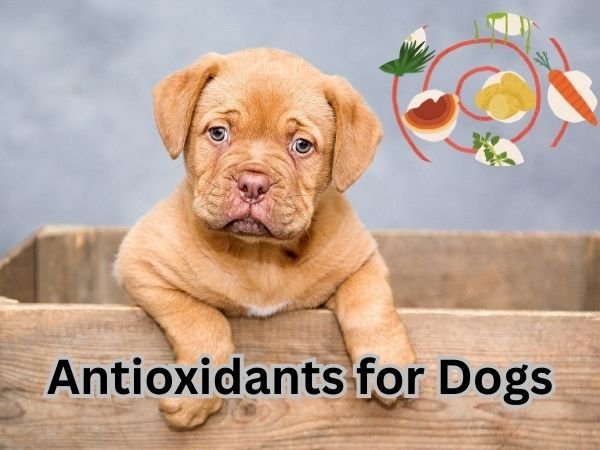
When pet owners hear the phrase “antioxidants for dogs,” two main ideas often come to mind: First, the growing buzz about superfoods and “antioxidant dog food” promising to boost your pup’s health. Second, the concern for keeping dogs’ immune systems strong-especially as they age or face health challenges. But what exactly are antioxidants for dogs, and why are so many pet parents adding them to their furry friend’s diet? Simply put, antioxidants are natural compounds that help protect your dog’s body from harmful molecules called free radicals, which can damage cells and lead to illness. More and more, veterinarians and dog lovers alike are turning to antioxidants-whether through wholesome foods or antioxidant supplements-to support dog health in practical, everyday ways.
In this easy-to-follow guide, we’ll break down why antioxidants for dogs are such a hot topic and how they can make a real difference in your pet’s life. You’ll discover the top five benefits of antioxidants for dogs, including a stronger immune system, better skin and coat, improved joint health, sharper cognitive function, and increased overall vitality. Whether you’re curious about natural antioxidant-rich foods or considering supplements, you’ll find actionable tips and trustworthy advice to help your dog thrive at any age. Let’s dive in and see how small changes can lead to big health rewards for your best friend!
What Are Antioxidants for Dogs?
Antioxidants are special substances that help keep your dog healthy by protecting their cells from damage. Every day, your dog’s body makes tiny particles called free radicals. These free radicals in dogs are a normal part of life, but too many of them can hurt cells and cause problems. When there are too many free radicals, it leads to something called oxidative stress, which can harm your dog’s organs and speed up aging.
How Antioxidants Work
- Antioxidants act like shields for your dog’s cells.
- They find and neutralize free radicals before these can cause damage.
- By doing this, antioxidants help maintain good cellular health and keep your dog’s body working well.
Why Are Antioxidants Important?
- They support your dog’s immune system, helping to fight off sickness.
- Antioxidants can help slow down aging and keep your dog feeling young.
- They protect your dog’s heart, brain, skin, and eyes from damage.
- Antioxidants may lower the risk of some diseases, like cancer and heart problems.
Where Do Dogs Get Antioxidants?
Dogs can get antioxidants from both natural foods and supplements:
Natural Foods:
- Colorful fruits and vegetables, such as blueberries, spinach, carrots, and sweet potatoes
- Some nuts and seeds (in safe amounts for dogs)
- Herbs like turmeric and parsley
Supplements:
- Special antioxidant supplements made for dogs, often containing vitamins like C and E, or minerals like selenium and zinc
- Always talk to your vet before giving your dog any new supplement.
Key Points to Remember
- Antioxidants help fight free radicals in dogs and reduce oxidative stress.
- They are important for your dog’s cellular health and overall well-being.
- You can support your dog by feeding them antioxidant-rich foods or, if needed, safe supplements.
Giving your dog the right amount of antioxidants helps them stay healthy, happy, and full of life!
How Do Antioxidants Work in a Dog’s Body?
Antioxidants are special nutrients that help protect your dog’s body from harm. They act like tiny bodyguards, fighting off dangerous molecules called free radicals. Free radicals are made naturally when your dog eats, plays, or even breathes. Sometimes, things like pollution, too much sun, or sickness can cause even more free radicals to build up.
What Is Oxidative Stress?
- Oxidative stress happens when there are too many free radicals and not enough antioxidants to stop them.
- Free radicals can damage your dog’s cells, tissues, and even DNA.
- This damage can lead to health problems like aging faster, joint pain, heart disease, and even cancer.
How Do Antioxidants Help?
- Antioxidants work by neutralizing free radicals before they can hurt your dog’s body.
- They give free radicals what they need so they stop causing trouble.
- Common antioxidants for dogs include vitamin C, vitamin E, beta-carotene, and selenium.
- These nutrients are found in colorful fruits and vegetables, as well as some dog foods and supplements.
- By fighting free radicals, antioxidants help keep your dog’s immune system strong, support healthy skin and eyes, and slow down the aging process.
Why Do Dogs Need Antioxidants?
- Dogs need antioxidants to stay healthy and fight off sickness.
- Antioxidants help reduce inflammation and protect against diseases like cancer, heart problems, and arthritis.
- They are especially important for older dogs, dogs with health issues, or dogs exposed to pollution or stress.
- Even healthy dogs can benefit from antioxidants to keep their bodies working their best
Are Antioxidants Safe for Dogs?
- Antioxidants are safe for most dogs when given in the right amounts7.
- Many antioxidants come from foods like carrots, blueberries, and spinach, which are safe and healthy for dogs.
- Some dogs may need extra antioxidants from supplements, especially if they are older or have health problems. Always talk to your vet before starting any new supplement
- Giving too much of certain antioxidants, like vitamin A or selenium, can be harmful, so it’s important to follow your vet’s advice
Antioxidants help your dog by fighting off harmful free radicals, protecting their body from damage, and keeping them healthy and happy. Most dogs can get the antioxidants they need from a balanced diet, but some may need a little extra help. Always work with your vet to make sure your dog is getting the right amount.
5 Powerful Benefits of Antioxidants for Dogs
Antioxidants are natural compounds that help protect your dog’s body from damage caused by harmful molecules called free radicals. By adding antioxidants to your dog’s diet, you can help them stay healthier, more energetic, and happier for longer. Let’s explore the top five benefits of antioxidants for dogs.
1. Boosts Immune System Function
A strong immune system helps your dog fight off illnesses and recover faster when they get sick. Antioxidants protect the immune cells in your dog’s body, making it easier for them to resist diseases and infections.
Key Points:
- Antioxidants like vitamin C, vitamin E, and beta carotene help immune cells do their job better.
- Dogs with enough antioxidants are less likely to get sick.
- Puppies, senior dogs, and dogs under stress especially benefit from immune support.
Common Question:
Which antioxidants are best for immune health?
Vitamin C, vitamin E, and beta carotene are some of the best choices for boosting your dog’s immune system.
2. Slows Aging and Supports Longevity
Just like people, dogs show signs of aging as they get older. Antioxidants help slow down this process by reducing damage to their cells, which can help your dog age gracefully and stay active for longer.
Key Points:
- Antioxidants fight “oxidative stress,” which is linked to aging.
- They help your dog maintain energy, mobility, and a sharp mind.
- Adding antioxidants can mean more healthy, happy years with your pet.
Common Question:
Can antioxidants really help my dog live longer?
Yes! By protecting cells from damage, antioxidants support healthy aging and may help your dog live a longer, fuller life.
3. Promotes Joint Health and Mobility
Joint pain and stiffness are common in older dogs and active breeds. Antioxidants can reduce inflammation and support the tissues that keep your dog’s joints healthy.
Key Points:
- Antioxidants help reduce swelling and pain in joints.
- Ingredients like eggshell membrane, green-lipped mussel, and astaxanthin are especially good for joint support.
- Dogs with arthritis or joint problems often feel better with more antioxidants in their diet.
Common Question:
Are there natural ways to help my dog’s joints?
Yes! Foods and supplements rich in antioxidants can ease joint discomfort and keep your dog moving comfortably.
4. Supports Skin and Coat Health
A shiny coat and healthy skin are signs of a well-cared-for dog. Antioxidants, especially vitamin E and beta carotene, play a big part in keeping your dog’s skin smooth and their coat glossy.
Key Points:
- Antioxidants protect skin cells from damage and dryness.
- They help reduce itching, redness, and other skin problems.
- Dogs with enough antioxidants often have softer, shinier coats.
Common Question:
How can I improve my dog’s coat and skin health?
Adding antioxidant-rich foods or supplements can make a noticeable difference in your dog’s appearance and comfort.
5. Enhances Cognitive and Heart Health
As dogs get older, they can develop memory problems or heart issues. Antioxidants protect the brain and heart, helping your dog stay sharp and active, especially in their senior years.
Key Points:
- Antioxidants support brain function and may slow memory loss.
- They help keep the heart strong and healthy.
- Senior dogs, in particular, benefit from extra cognitive and heart support.
Common Question:
Can antioxidants help my aging dog stay alert and active?
Absolutely! Antioxidants provide “cognitive support” and promote “heart health in dogs,” making them a smart choice for older pets.
Adding antioxidants to your dog’s diet is a simple way to boost their health in many important ways. Whether you choose antioxidant-rich foods or safe supplements, your dog will thank you with more energy, a shinier coat, and a happier, healthier life. Always talk to your veterinarian before making big changes to your dog’s diet or adding new supplements.
Top Natural Sources of Antioxidants for Dogs
Antioxidants are special nutrients that help protect your dog’s body from damage caused by free radicals. Free radicals can lead to health problems and speed up aging. By giving your dog foods rich in antioxidants, you can support their immune system, keep their skin and coat healthy, and help them stay active and happy.
Antioxidant-Rich Fruits and Vegetables
Many fruits and vegetables are safe for dogs and full of antioxidants. Here are some of the best options:
- Blueberries: Packed with vitamins C and K, fiber, and anthocyanins, blueberries help fight free radicals and support your dog’s brain and immune system.
- Blackberries, Raspberries, and Strawberries: These berries are loaded with antioxidants and are safe for dogs in small amounts.
- Sweet Potatoes: Rich in beta-carotene (which turns into vitamin A), sweet potatoes support eye health, skin, and the immune system.
- Carrots: Another great source of beta-carotene, carrots are good for your dog’s eyes and can be given raw or cooked.
- Spinach and Kale: These leafy greens provide vitamins E and C, iron, and other antioxidants that help keep your dog’s cells healthy.
- Broccoli: Contains sulforaphane and vitamin C, which help reduce inflammation and support overall health.
- Green Beans: Full of vitamin A and C, green beans are a crunchy, low-calorie snack for dogs.
- Pumpkin: High in beta-carotene and fiber, pumpkin is gentle on your dog’s stomach and supports digestion.
- Tomatoes (ripe and in small amounts): Tomatoes have lycopene, an antioxidant that helps protect cells. Only give ripe tomatoes and avoid green parts, which can be harmful.
- Red Bell Peppers: These are high in vitamin C and beta-carotene.
- Cranberries: Support urinary health and provide antioxidants.
Other Safe Plant-Based Sources
- Chickpeas, Peas, and Fava Beans: These legumes have antioxidants like flavonoids and phenolic acids.
- Oats and Quinoa: Grains like oats and quinoa are rich in vitamin E and other antioxidant compounds.
- Turmeric: This spice contains curcumin, which has strong antioxidant and anti-inflammatory effects.
Animal-Based Sources of Antioxidants
Some animal-based foods also provide antioxidants:
- Eggshell Membrane: This is the thin layer inside eggshells. It contains nutrients that support joint health and have antioxidant properties.
- Green-Lipped Mussels: These come from New Zealand and are full of antioxidants, omega-3 fatty acids, and nutrients that help with joint health and reduce inflammation.
- Eggs and Fish: Both are safe for dogs and provide vitamin A and other antioxidants.
What Foods Are Safe Antioxidant Sources for Dogs?
Most fruits and vegetables listed above are safe for dogs when given in small, bite-sized pieces. Always wash them well and remove any seeds, pits, or stems. Avoid giving your dog grapes, raisins, onions, garlic, and unripe tomatoes, as these can be toxic.
You can add these antioxidant-rich foods to your dog’s regular meals or offer them as healthy treats. Start with small amounts to see what your dog likes and to make sure their tummy agrees.
Simple Tips for Adding Antioxidants to Your Dog’s Diet
- Mix a few blueberries or chopped carrots into your dog’s food.
- Offer a spoonful of plain, canned pumpkin as a treat.
- Steam and chop broccoli or green beans for an easy snack.
- Try freeze-dried green-lipped mussel treats for joint and antioxidant support.
- Sprinkle a pinch of turmeric on your dog’s food for extra benefits.
By including a variety of these natural foods in your dog’s diet, you can help keep them healthy, energetic, and happy. Always talk to your vet before making big changes to your dog’s meals, especially if your dog has health issues.
How to Add Antioxidants to Your Dog’s Diet
Keeping your dog healthy and happy can be as simple as adding more antioxidants to their meals. Antioxidants help protect your dog’s cells, support their immune system, and may even help them live longer. Here’s how you can safely and easily introduce antioxidant-rich foods and supplements to your dog’s daily routine.
Start with Colorful Fruits and Vegetables
- Choose safe, dog-friendly options like blueberries, strawberries, blackberries, and raspberries. These berries are packed with vitamins and antioxidants and can be given fresh or frozen as treats or mixed into your dog’s food.
- Add cooked vegetables such as carrots, sweet potatoes, yellow squash, broccoli, spinach, and kale. Cooking these veggies makes them easier for dogs to digest and helps release more nutrients.
- Green beans and tomatoes (in moderation) are also good sources of antioxidants and can be chopped and added to meals.
- Remember, the more colorful the food, the more antioxidants it likely contains. Try to include a variety of colors for the best results.
Try Antioxidant Supplements
- Supplements come in many forms, including soft chews, powders, tablets, and liquids. These can be mixed into your dog’s regular food or given as treats.
- Look for supplements that contain natural antioxidants like vitamin C, vitamin E, turmeric (curcumin), astaxanthin, and CoQ10
- Always follow the dosing instructions on the supplement packaging, and start with the lowest recommended dose.
Mix It Up for Variety
- Rotate different fruits and vegetables to give your dog a range of antioxidants and nutrients. For example, offer blueberries one week and carrots the next46.
- Combine antioxidant-rich foods with your dog’s regular meals or use them as healthy snacks.
- If your dog is picky, try mashing fruits or veggies and mixing them with their favorite food.
Watch for Allergies and Sensitivities
- Introduce new foods slowly, one at a time, and watch for any signs of allergies or stomach upset.
- If your dog has a sensitive stomach, start with small amounts and gradually increase as they get used to the new foods.
Consult Your Veterinarian
- Before making big changes to your dog’s diet or adding supplements, talk to your vet. Every dog is different, and your vet can help you choose the right foods and supplements for your dog’s age, size, and health needs46.
- Your vet can also help you avoid over-supplementation, which can be harmful.
Practical Tips for Success
- Use antioxidant-rich foods as treats or meal toppers for an easy boost.
- Prepare veggies by steaming or lightly cooking them, which makes them easier for dogs to digest.
- Store fresh fruits and vegetables properly to keep them safe and nutritious.
- Always remove seeds, pits, and stems from fruits and veggies before feeding them to your dog.
Adding antioxidants to your dog’s diet doesn’t have to be complicated. With a little planning and variety, you can help your furry friend enjoy better health, more energy, and a longer, happier life.
Conclusion
Antioxidants offer many benefits for dogs, including a stronger immune system, healthier skin and coat, slower aging, better cell protection, and faster recovery from illness. Adding antioxidant-rich foods or supplements to your dog’s diet is a simple way to help them live a healthier, happier life.
Consult your vet about the best antioxidant options for your dog. Your vet can help you choose the right foods or supplements to meet your dog’s unique needs. Give your furry friend the best chance at a long and joyful life!
FAQ
What are the best antioxidants for dogs?
The best antioxidants for dogs include vitamins C and E, beta-carotene, and selenium. Natural sources like blueberries, spinach, and carrots are great. These help protect your dog’s cells and support overall health.
Can dogs get too many antioxidants?
Yes, too many antioxidants can upset your dog’s balance and may cause health issues. Always follow your vet’s advice when giving supplements or treats with antioxidants.
Are homemade antioxidant treats safe?
Yes, homemade antioxidant treats can be safe if made with dog-friendly fruits and veggies. Avoid ingredients like chocolate, grapes, or onions. Always check with your vet before adding new foods.
How do I know if my dog needs more antioxidants?
If your dog is aging, has low energy, or gets sick often, they might need more antioxidants. Ask your vet to check and recommend safe options.
What’s the difference between natural and synthetic antioxidants for dogs?
Natural antioxidants come from whole foods like fruits and vegetables. Synthetic ones are made in labs. Both can help, but natural sources are usually safer and better for long-term health.



